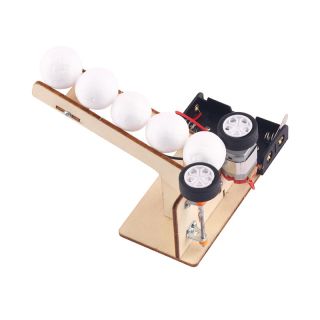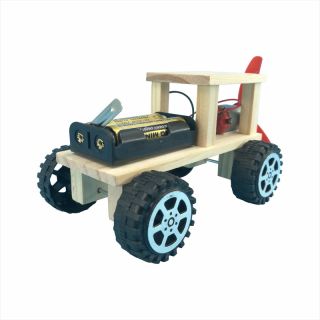All Categories
STEM Walking Robot Kit - Cat# 80-50-W060
In stock
SKU
80-50-W060
CA$12.00
- Buy 2 for CA$11.00 each and save 8%
- Buy 6 for CA$8.50 each and save 29%
STEM Walking Robot Kit — A Hands-On STEM Experience
Engage your students with a project that blends mechanics, robotics, and creative engineering. The STEM Walking Robot Kit challenges learners to build a walking robot mechanism and explore how mechanical linkages convert motion into a realistic gait.
This kit is perfect for classrooms, lab sessions, or after-school STEM clubs.
What’s in the Kit & How It Works
The kit includes parts to build the robot’s frame, leg linkages, motor drives, shafts, and detailed instructions.
Students assemble the mechanical linkages and attach the motor so that when powered, the robot’s legs move in a walking pattern.
The design enables the conversion of rotational motion from the motor into alternating leg movements, mimicking walking.
A Teacher’s Resource Guide is available in “Additional Resources” to support lesson planning.
STEM Concepts Illuminated
| STEM Area | Key Concepts & Principles | Classroom Applications & Extensions |
|---|---|---|
Mechanical Engineering | Linkages, cams, crankshafts, gait mechanism | Students analyze linkage geometry to produce smooth stepping motion; try altering linkage lengths |
Physics & Motion | Forces, torque, friction, stability | Explore how friction and weight distribution influence walking efficiency and balance |
Energy & Power | Electrical → Mechanical energy conversion | Measure how much power the motor draws; discuss mechanical efficiency and energy losses in the robot |
Robotics & Systems | Control, actuation, iterative design | Encourage students to refine timing, adjust leg cycles, or vary walking speed |
Mathematics & Geometry | Ratios, symmetry, motion curves | Use measurements, angles, and ratios to optimize linkage alignment and walking stride |
Why Teachers Will Appreciate It
Hands-On & Visible Learning: Students build a robot that walks, offering a tangible demonstration of linkage systems.
Cross-Disciplinary Connections: Bridges physics, engineering, robotics, and mathematics.
Scalable Complexity: For younger or novice students, focus on building; for advanced learners, push tweaking and performance optimization.
Compact & Classroom-Ready: The kit is affordable and easy to distribute among groups.
Supports Inquiry & Iteration: Students can experiment, test, redesign, and learn from failure.
Classroom Activity Ideas
Walking Challenge: Ask teams to see whose robot covers a set distance fastest or most smoothly.
Linkage Experimentation: Let groups vary linkage lengths or pivot points and compare walking patterns.
Power vs. Speed: Record motor input vs walking speed; discuss trade-offs between speed and stability.
Obstacle Course: Design a simple terrain or obstacle course and test different walking gaits or leg designs.
Documentation & Reflection: Have students sketch their linkage diagrams, explain their design choices, and reflect on what they would change next.
Bring mechanical motion and design thinking together in an exciting project. With the STEM Walking Robot Kit, your students won’t just study linkages and motion — they’ll build, test, and animate them with their own hands.










